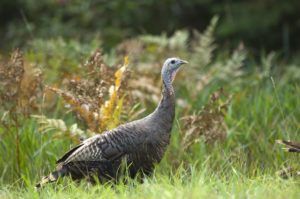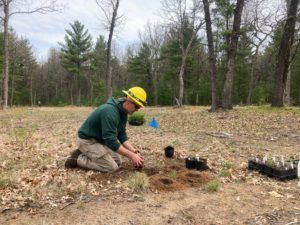Oak Savannas are more than OAK-ay: Volunteer with On the Ground in Kent County to Help Restore One of our State’s Rarest Habitat Types
Join MUCC’s On the Ground (OTG) program in partnership with Kent Conservation District for an oak savanna habitat restoration day at Cannonsburg State Game Area.

Wildlife such as wild turkeys, white-tailed deer and monarch butterflies benefit from oak savannas.
Oak savannas can be defined as groups of scattered oak trees, acting as a transition system between prairies and woodland habitats. The scattered trees allow plenty of sunlight on the ground allowing grasses and forbs (flowering plants) to become plentiful in the savanna. This unique habitat provides benefits to both woodland and prairie wildlife. Oak savannas are an exceedingly rare habitat not only in Michigan but all across the Midwest. Habitat fragmentation from infrastructure development, suppression of prairie fires, and the encroachment of invasive species are affecting our oak savannas. Help On the Ground and Kent County Conservation District restore one of the most unique habitats in our state.
We will be spreading native grass and forb seeds as well as removing invasive vegetation in an effort to increase biodiversity and prevent the establishment of non-native invasive vegetation.

DNR Biologist Bob Sanders plants a native wildflower in an oak savanna restoration zone in the Manistee National Forest.
All ages are welcome to attend. Registered participants will receive a free lunch and a volunteer appreciation gift. Attendees are encouraged to bring reusable water bottles, although bottled water and snacks will be provided throughout the day. Please wear good hiking shoes and tear-resistant clothes. This project will take place rain or shine unless there is severe weather so please dress accordingly!
For more details and volunteer registration, click HERE .
Please contact Habitat Program and Partnerships Coordinator Kristina Kennedy at kkennedy@mucc.org with any questions regarding this event or the OTG program.
Recent Posts



